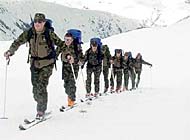Swiss army shares alpine secrets with foreign troops

The Swiss army has for four years been training foreign troops in mountain skills. The mountain specialists - or "soldiers with skis", as they are known locally - run a variety of courses from skiing to climbing to dealing with avalanches.
The courses are part of the Swiss contribution to Nato’s Partnership for Peace (PfP), a project set up by the alliance in collaboration with armies of the former Soviet block.
The Swiss unit, which has its base in the mountain village of Andermatt at the foot of the Gotthard pass in central Switzerland, offers summer and winter training courses in mountain skills, involving special skills in climbing, orientation and the handling of specialist equipment.
In 1999 another course was added to the Swiss programme – avalanche skills. Forty participants from 13 countries, among them the United States and Kazakhstan, took part in last year’s course, which involved danger assessment and rescue skills.
In March, the mountain specialists are taking their efforts a step further by running a skiing course for the first time – 15 officers from five armies are scheduled to participate.
“The course will offer skiing on and off the slopes, cross-country skiing and some avalanche training,” says the mountain specialists’ technical director of training, Hans-Martin Henny.
Aside from the courses, the Swiss Alps are a regular training group for various armies. Every week, 60 Belgian army officers pursue their own training programme in Andermatt, and the Swiss have a similar arrangement with the Dutch army to assist in the training of mountain techniques.
“It looks like more of a holiday,” said René Egger, a Swiss tourist who watched the Belgians queuing up at a ski lift and enjoying the Alpine sun. “I would like to know who pays for this extravaganza.”
Henny points out that in the case of bilateral military agreements like those involving the Belgians and the Dutch, they pay for their training themselves. “We only get involved in the training of their instructors.”
In exchange for offering training facilities to the Belgians and the Dutch in Switzerland, the Swiss Air Force trains some of its pilots in Belgium and the Netherlands.
Henny says troops from all Nato countries can use mountain training. “They are part of Nato and may get involved in mountain operations, for instance doing peace keeping duties in the Balkans.”
In the case of PfP exchange programmes, it falls to the Swiss to finance the training and accommodation of foreign troops through the defence ministry’s budget for peace building measures. “But the opposite is true when we send troops for training programmes abroad,” says defence ministry spokesman, Kai-Gunnar Sievert.
Sievert says that as an alpine nation, “skiing is a core competence of the Swiss army, and it is therefore natural that we should offer skiing practice in international exchange programmes.”
Since 1999, the mountain specialists’ school has run courses in dealing with avalanches. Learning to assess the risk of avalanches, known as the “white death” across the Alps, is a key part of the training for the 100 recruits at the school in Andermatt.
The recruits have to take snow profiles in steep terrain, the most important task in assessing the risk of avalanches. A square of roughly four times two metres is dug from the snow. Then temperatures are taken and the shape and consistency of the snowflakes measured.
After finishing the winter part of their 15-week training course, most recruits will be posted to different combat units.
“In theory, it is our job to assess and advise commanders on whether it is safe to use particular mountain routes,” says 24-year-old recruit, Christian Bordin.
“But in reality, there is hardly time for that and we rely on the daily avalanche bulletins of the Federal Institute for Avalanche Research in Davos. But it’s good to know how they come to their conclusions.”
The Davos institute, which issues daily avalanche bulletins for the benefit of tourists and the general public, depends in turn on daily reports from the various mountain regions of Switzerland. For the canton of Uri, those reports are coordinated by the Andermatt-based mountain specialists.
The Davos institute now operates 75 robot stations throughout Switzerland that measure temperature and snow quality at different depths and feed the information directly into the institute’s computers.
The Swiss army has over 600 mountain specialists on active and reserve duty. They generally confine their activities to military duties, but occasionally are called in when the civilian authorities cannot cope.
“We get drafted in when a really bad disaster hits,” says Henny. “This has happened twice in the past two years: in Evoléne when an avalanche went down on a village, killing 12 people, and last summer when a landslide struck the village of Gondo, killing 13.”
by Markus Haefliger

In compliance with the JTI standards
More: SWI swissinfo.ch certified by the Journalism Trust Initiative
You can find an overview of ongoing debates with our journalists here. Please join us!
If you want to start a conversation about a topic raised in this article or want to report factual errors, email us at english@swissinfo.ch.